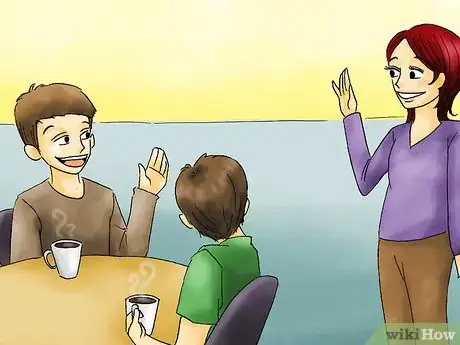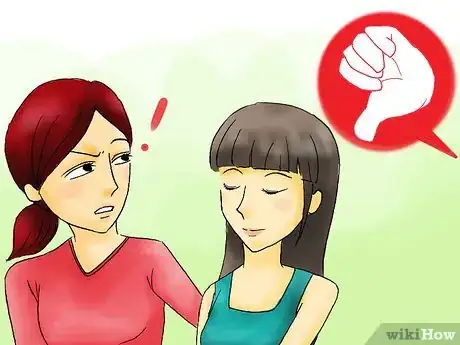X
wikiHow is a “wiki,” similar to Wikipedia, which means that many of our articles are co-written by multiple authors. To create this article, volunteer authors worked to edit and improve it over time.
There are 7 references cited in this article, which can be found at the bottom of the page.
This article has been viewed 27,698 times.
Learn more...
The art of being a persuasive and friendly person who attracts friendship wherever you go is one that can be learned. This isn't about forcing people to like you or befriend you; it's about being so interesting, caring and inspiring that people naturally gravitate toward wanting to spend time around you and to include you in their list of whom they count as friends.
Steps
-
1Understand what you want by way of having people be friends with you. There are varying degrees of friendship, from the closest best friends to the circle of ever distancing friends whom you may not see often but who still are counted as your friends and people you can trust and rely on, and who can feel the same way about you.
Realistically, the circle of close and best friends must, by necessity, be small. But you can have many friends as a whole with whom you feel comfortable to spend time and catch up with and to know they've got your back when in need.
Realize that different people have different interpretations of what it means to be a friend. You do need to be open-minded and ready to learn from others rather than treating friendship as a narrow concept. However, at the heart of friendship is loyalty, the ability to get along even when holding polar opposite opinions, a willingness to listen and a sense of trust. -
2Be friendly. To have friends, it may come across as trite, but you need to be friendly. This means that you must be prepared to be open to other people, to be encouraging and to not be afraid of making the first move to introduce yourself and start a conversation.
It also means not expecting other people to respond in kind; be unconditional in your friendliness, don't attach expectations or "must-dos" to it.[1]Advertisement -
3Be considerate of other people. Hold doors open, carry their parcels and be there when they need a hand.[2] Respect their time and keep your promises when you make them. Importantly, be honest with people.
-
4Notice the person and be actively aware of them. When a person feels ignored, they automatically go into a defensive mode and start thinking negatively toward the person ignoring them.
Do your best to make each and every person feel like they are the only person that matters for the time that you interact with them. This is a skill any person can master if they so wish, just by being attentive and genuinely interested in each and every person they meet.[3]- Always be interested in what the other person's story is. Ask questions, ask for clarifications and be genuine in finding out more about them.
-
5Be supportive. When a person needs help, advice or guidance, be a support for them. Offer your help where needed and provide your advice if asked.
Don't force unwanted advice onto people though, especially the preachy, judgmental sort that causes people to want to wriggle away. Just look for the ways in which you can offer support that will actually help and do good, and stand back to think about how you'd feel in the same position of need.[4]
Remember that often you're not expected to solve a friend's problems. But you can let them know you're there for them, which is often what they really need to know. And it can't hurt at times to suggest a good lawyer, doctor, psychologist, car repairer, etc., as relevant. -
6Match the effort of the other person. It's very simple––put back in what you take out in relationships. If they go to the trouble of helping you in some way, then be sure to return the favor. If they take the time to sit down and talk to you, then do the same for them. If they make the effort to treat you as a friend, then do likewise.
By matching the effort, you ensure equal relations and can be assured that the friendship will endure with each person so treated. -
7Be proud of other people. Notice their accomplishments and talents and compliment them often on these. Don't hold back on giving credit where it is due; people love and need to hear that they're doing a good job, achieving a goal, doing their best and making the world better for everyone.
This form of recognition occurs so infrequently, that you have the upper hand when you make a conscious effort to compliment other people on the things that matter, and do it often. Through doing this, you can show them that you admire their efforts and tenacity, you respect them and you are proud to be their friend.[5] -
8Keep confidences. Friends are people who hear secrets and don't tell. They know the worst and don't care because they are there for you and have your back. Thus, you must cultivate the ability to stay quiet on the titillating facts you learn about your friends and keep those locked away in the treasure chest of your mind.
Being non-judgmental can go a long way to helping you to achieve this because you won't feel so offended or shocked that you just have to divulge for gossip's sake. By being non-judgmental, you can act as an observer and may even have a role in offering objective advice. -
9Be loyal. Following on from keeping confidences, also defend your friends. Don't allow gossip about them to go on unchallenged; step in and inform the gossipers that you are the person's friend and that they are rumor-mongering. Be there for your friends through the hard times as well as the good, so that they know you are solid and trustworthy.
Remember––loyalty isn't about solving their problems for them or even agreeing with them or their actions. It is about putting the friendship before judgment and not giving up on it.[6] -
10Be authentic you. The main advice of all is to stay you through each and every friendship. You don't need to reshape yourself for others. While it is normal to communicate in different styles with different people, depending on their age, rank and personality, this is not the same as changing yourself completely to fit someone else's expectations.
Know the difference and don't be afraid to let other people know the real you, for if they don't, then you're not real friends together.[7]
Advertisement
Warnings
- There will always be some people for whom friendship feels threatening, undesirable, too much like hard work or obtrusive. You cannot change these people but you can alter how you react to their negative responses by just staying friendly and not letting their barrier bother you. You don't need to make them your friends, just keep on being nice to them; the ice may or may not melt but they'll realize you won't be taking their attitude personally.⧼thumbs_response⧽
Advertisement
References
- ↑ https://www.psychologytoday.com/us/blog/your-wise-brain/201211/be-friendly
- ↑ https://www.businessinsider.com/habits-of-extremely-considerate-people-2014-8
- ↑ https://www.helpguide.org/articles/relationships-communication/making-good-friends.htm
- ↑ https://www.psychologytoday.com/us/blog/fulfillment-any-age/201708/six-ways-be-more-supportive-those-closest-you
- ↑ https://www.forbes.com/sites/francesbridges/2018/02/07/10-ways-to-make-people-like-you-from-how-to-make-friends-and-influence-people/
- ↑ https://www.powerofpositivity.com/5-qualities-truly-loyal-relationship/
- ↑ https://www.psychologytoday.com/intl/blog/click-here-happiness/201904/develop-authenticity-20-ways-be-more-authentic-person
About This Article
Advertisement




































































